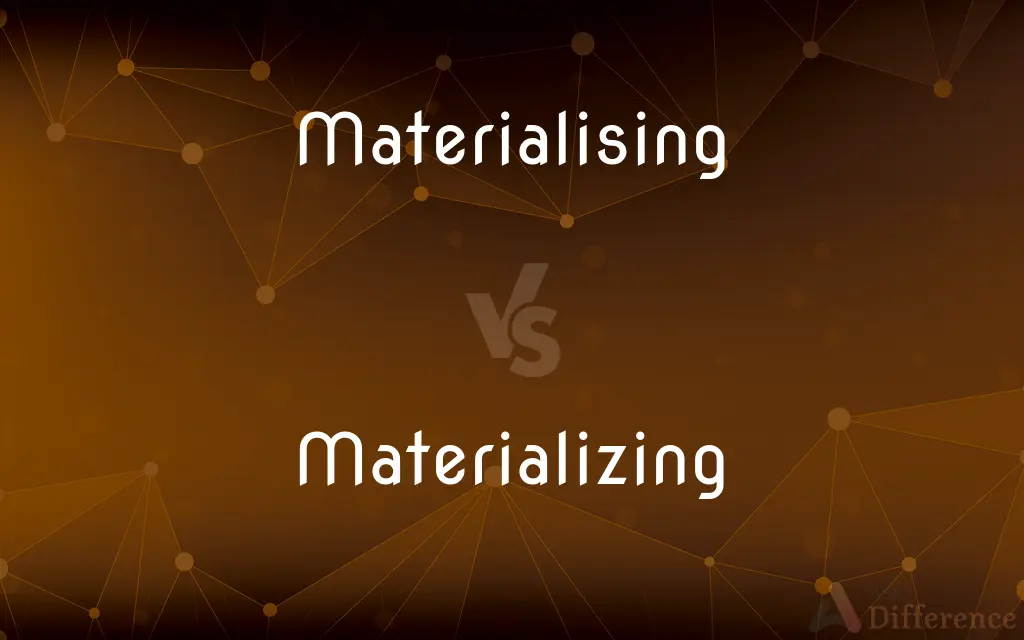Materialising vs. Materializing — What's the Difference?
By Tayyaba Rehman — Published on January 14, 2024
Materialising and materializing are the same in meaning, referring to something taking physical form, but differ in spelling; 'materialising' is British English, 'materializing' is American English.

Difference Between Materialising and Materializing
Table of Contents
ADVERTISEMENT
Key Differences
Materialising and materializing both describe the process of something becoming real or tangible from an abstract or theoretical state. The difference lies in their spelling, which reflects the variation between British and American English. While 'materialising' is commonly used in the UK and other countries using British English, 'materializing' is the preferred spelling in the United States.
The usage of 'materialising' in British English carries the same connotations and meanings as 'materializing' in American English. Both terms are often used in contexts where ideas, plans, or dreams are becoming actual, tangible realities. For example, a concept 'materialising' in a British context would be described as 'materializing' in an American one, with no change in the underlying meaning.
In literature and formal writing, the choice between 'materialising' and 'materializing' can also indicate the intended audience or the origin of the author. British authors or publications aimed at a British audience will typically use 'materialising', while American writers or publications for American readers will use 'materializing'.
The pronunciation of 'materialising' and 'materializing' is virtually identical, with the primary difference being in their orthography. This distinction is a typical example of the variations found between British and American English spellings, similar to 'colour' vs. 'color' or 'favour' vs. 'favor'.
Despite the spelling differences, the practical application and understanding of 'materialising' and 'materializing' remain consistent across English-speaking countries. Whether in scientific, philosophical, or everyday contexts, both spellings convey the process of an abstract concept taking on a concrete form.
ADVERTISEMENT
Comparison Chart
Spelling
's' used in 'ising'
'z' used in 'izing'
Usage
Preferred in the UK
Preferred in the USA
Audience
Aimed at British readers
Aimed at American readers
Pronunciation
Identical to Materializing
Identical to Materialising
Contextual Meaning
Same as Materializing
Same as Materialising
Compare with Definitions
Materialising
Becoming Real: Transforming from idea to reality.
Her vision of a successful business is finally materialising.
Materializing
Becoming Tangible: Turning from concept to physical form.
The artist's ideas were materializing into an impressive sculpture.
Materialising
Manifesting: Becoming evident or observable.
Signs of economic recovery are materialising.
Materializing
Forming: Developing into a structured entity.
The strategy for the project is finally materializing.
Materialising
Appearing: Emerging into visible form.
As we watched, a figure started materialising in the mist.
Materializing
Emerging Visibly: Coming into sight or existence.
A ghostly shape began materializing in the dark room.
Materialising
Crystallizing: Becoming clear or definite.
His thoughts on the subject were materialising into a coherent theory.
Materializing
Solidifying: Gaining a solid or definite form.
Her vague plans for the trip were quickly materializing.
Materialising
Taking Shape: Developing into a discernible form.
The plans for the new park are slowly materialising.
Materializing
Becoming Apparent: Showing up or becoming known.
Evidence of climate change is rapidly materializing.
Materialising
Present participle of materialise
Materializing
To come into existence; become real
Their support on the eastern flank did not materialize.
Materializing
To appear, especially suddenly
"As they plunged down the highway, hazy purple mountains materialized" (Tom Bissell).
Materializing
To take physical form or shape. Used especially of a spirit or ghost.
Materializing
To cause to become real or actual
By building the house, we materialized a dream.
Materializing
To cause to become materialistic
"Inequality has the natural and necessary effect ... of materializing our upper class, vulgarizing our middle class, and brutalizing our lower class" (Matthew Arnold).
Materializing
Present participle of materialize
Common Curiosities
Does the meaning of materialising differ in British English?
No, the meaning is the same in both British and American English.
Is one spelling more correct than the other?
No, correctness depends on the variant of English being used.
Can both spellings be used in international contexts?
Yes, both are understood globally, though regional preferences may apply.
Are materialising and materializing interchangeable?
Yes, they are interchangeable but depend on the form of English being used.
Is materializing used in technology fields?
Yes, especially in discussions about innovations and developments.
Can either term be used in artistic contexts?
Yes, both are used to describe the creative process of ideas taking form.
Does materialising imply a slow process?
Not necessarily; it can be slow or quick, depending on context.
Is materializing often used in scientific contexts?
Yes, it's common in both scientific and metaphysical discussions.
Is one form more formal than the other?
No, formality is the same; it's just a matter of regional spelling.
Can materialising be used metaphorically?
Yes, it's often used metaphorically to describe ideas becoming real.
Does the spelling impact pronunciation?
No, both words are pronounced the same way.
Is materialising more common in British literature?
Yes, it aligns with British spelling conventions.
Can materializing imply physical and non-physical forms?
Yes, it applies to both tangible and intangible forms.
Are there any other differences besides spelling?
No, the only difference between the two is their spelling.
Do dictionaries list both spellings?
Yes, most English dictionaries list both variations.
Share Your Discovery

Previous Comparison
Boxing in C# vs. Unboxing in C#
Next Comparison
Centripetal Acceleration vs. Centrifugal AccelerationAuthor Spotlight
Written by
Tayyaba RehmanTayyaba Rehman is a distinguished writer, currently serving as a primary contributor to askdifference.com. As a researcher in semantics and etymology, Tayyaba's passion for the complexity of languages and their distinctions has found a perfect home on the platform. Tayyaba delves into the intricacies of language, distinguishing between commonly confused words and phrases, thereby providing clarity for readers worldwide.
















































